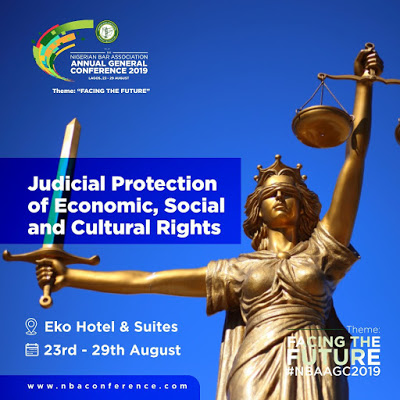
The 1999 Constitution of the
Federal Republic of Nigeria created a bifurcation of human rights. On one hand
is the Fundamental Human Rights of every citizen of Nigeria entrenched in
Chapter four of the constitution. On the other hand, the Constitution also made
provision for Economic, Social and Cultural rights (Ecosoc) entrenched in
chapter two of the constitution.
Federal Republic of Nigeria created a bifurcation of human rights. On one hand
is the Fundamental Human Rights of every citizen of Nigeria entrenched in
Chapter four of the constitution. On the other hand, the Constitution also made
provision for Economic, Social and Cultural rights (Ecosoc) entrenched in
chapter two of the constitution.
These rights include the
right to employment, housing and shelter, health, food, water, safe environment
and education. (Section 16-20). Ecosoc rights reflect the higher
aspirations of human beings for their quality of life. These are provided in
chapter two of the Constitution and are also called “Fundamental Objectives and
Directive Principles of State Policy”. These rights are non justiciable as
expressly provided under the constitution.(Section 6(6)(c))
right to employment, housing and shelter, health, food, water, safe environment
and education. (Section 16-20). Ecosoc rights reflect the higher
aspirations of human beings for their quality of life. These are provided in
chapter two of the Constitution and are also called “Fundamental Objectives and
Directive Principles of State Policy”. These rights are non justiciable as
expressly provided under the constitution.(Section 6(6)(c))
However, one of the various
ways these rights can be enforced is to apply the provisions of the African
Charter of Human and People’s Right. Nigeria has since domesticated this treaty
and by virtue of that, these rights are justiciable and enforceable in Nigeria.
ways these rights can be enforced is to apply the provisions of the African
Charter of Human and People’s Right. Nigeria has since domesticated this treaty
and by virtue of that, these rights are justiciable and enforceable in Nigeria.
Another way these rights can
be made enforceable is through the court. Judicial protection was accorded to
these rights in the case of Archishop Okogie v A. G of Lagos State and
subsequently A.G Ondo v A.G Federation, A.G Lagos v A.G Federation. The
court in these cases held that the Federal and State Government have
legislative powers over some matters spelt out in chapter two and thus have
constitutional powers to make them enforceable. This has been seen to be a good
step in the right direction.
be made enforceable is through the court. Judicial protection was accorded to
these rights in the case of Archishop Okogie v A. G of Lagos State and
subsequently A.G Ondo v A.G Federation, A.G Lagos v A.G Federation. The
court in these cases held that the Federal and State Government have
legislative powers over some matters spelt out in chapter two and thus have
constitutional powers to make them enforceable. This has been seen to be a good
step in the right direction.
It has been said that where
there is a wrong, there should be a remedy. Such remedy should be made
available where there has been a breach of any of the Ecosoc rights.
there is a wrong, there should be a remedy. Such remedy should be made
available where there has been a breach of any of the Ecosoc rights.
The question that easily
comes to mind is, how can Economic, Social and Cultural rights be strengthened
through litigation?
comes to mind is, how can Economic, Social and Cultural rights be strengthened
through litigation?
The various issues and
challenges of judicial enforcement of Ecosoc rights in Nigeria and the way
forward would be discussed at the Plenary Session of the NBA Annual General
Conference scheduled to hold on;
challenges of judicial enforcement of Ecosoc rights in Nigeria and the way
forward would be discussed at the Plenary Session of the NBA Annual General
Conference scheduled to hold on;
Date:
Wednesday, 28th August 2019
Wednesday, 28th August 2019
Time:
9.00 – 10.30
9.00 – 10.30
Venue:
Pats-Ocholonu Hall, Tent 2
Pats-Ocholonu Hall, Tent 2
Speakers:
Moderator: Osai Ojigho
(Country Director, Amnesty International)
(Country Director, Amnesty International)
Panelists: Dr.
Dorcas Odunaike
Dorcas Odunaike
Eno Akpan
